* You are viewing Posts Tagged ‘Databases’
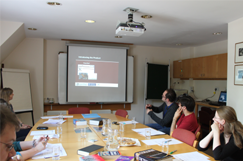
Introducing the product.
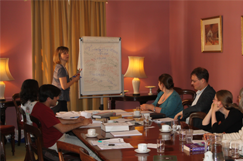
Creating the shortlist.
With the autumn launch of the Project’s union catalogue of early modern letters getting ever closer, and issues of design and functionality now sorted, we are turning our attention to broader questions of digital identity, digital presence, and branding. Heeding UCL digital humanities expert Melissa Terras’s insight that online resources ‘should be taking [their] digital identity and digital presence a lot more seriously’, and aware that ‘naming your brand is the most challenging, momentous, and necessary phase in the process of branding’, we hand-picked a crack team of scholars, librarians, editors, and linguists external to the Project to help us formulate an appropriate appellation for our new resource. Over an intensive ‘logo lunch’ at Linacre College, Dr Kim McLean-Fiander guided our set of sobriquet suggesters through a series of mind-bending puzzles and tasks designed to release creative juices, unlock associative thinking, and lead participants to that elusive ideal name. While the results of the exercise will remain under wraps for now, the input we received was invaluable, and we would like to thank all of the participants for giving us their time.
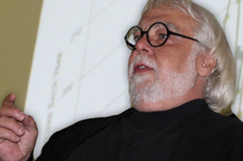
Professor Hatch during his talk.
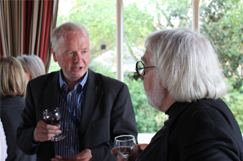
Discussions continue over wine.
In the opening paper of our second seminar series on Thursday 5 May, Professor Robert A. Hatch (University of Florida) got us off to a rousing start with a paper entitled ‘De-Centring the Big Picture: The Scientific Revolution and the Republic of Letters’. In a wide-ranging and suggestive analysis, Hatch argued that correspondence networks were the foremost facilitators of the new science in the early modern period (and vice versa), and for the creation and of vibrant intellectual communities around emergent fields such as astronomy. Compared to printed texts, suggested Hatch, letters were immediate and inclusive, situated the discussion of intellectual themes within the minutia of daily life, and were the primary medium for the gestation and discussion as well as the ultimate dissemination of scientific ideas in this period. The importance of scribal publication as an end in itself throughout the seventeenth century was further emphasized during discussion. Hatch illustrated his talk with a dazzling series of maps and graphs generated from his impressive personal database of scientific correspondences (which includes metadata on the letters of Peiresc, Gassendi, Bouilliau, and many other luminaries), although the necessity of combining quantitative exercises with qualitiative assessments of the formation of epistolary archives was underlined during a lively question and answer session. Seminars take place in the Faculty of History on George Street on Thursdays at 3pm. For future talks in the series, please see the seminar webpage.
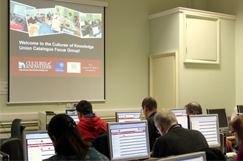
Testing the interface.
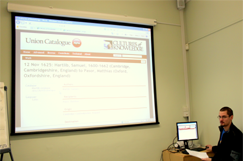
Discussing improvements.
With the front-end prototype of the Project’s union catalogue (introduced at our 2010 conference) now at an advanced stage of development – 39,225 letter records and counting! – Friday 4 February provided us with an opportunity to test its existing features and solicit additional suggestions from a range of end users from both within and outside the Project. Under the auspices of Dr Kim McLean-Fiander, a group of librarians, scholars, systems developers, web designers, and user experience specialists spent the morning working their way through a series of key tasks developed to test the catalogue’s function and design, and then recording their experiences, both positive and negative, on specially created feedback forms. Testers regrouped in the afternoon to discuss necessary refinements and to make additional suggestions to the catalogue on a screen-by-screen basis. The feedback we received was invaluable, and we would like to thank all of our participants for giving up their time to help us improve the catalogue, the public version of which will be launched in autumn 2011.
Kim McLean-Fiander
November 12, 2010
Conferences and Workshops, Events, Project Updates, Projects and Centres
Tags: Bodleian Resources, Databases, Digital Miscellanies Index, Digitization, Eighteenth Century, Electronic Enlightenment, Seventeenth Century, Union Catalogue
A report on the roundtable is now available on the CEMS blog
 On Thursday 18 November 2010, the Centre for Early Modern Studies (CEMS) at Oxford will host a roundtable presentation of three early modern digital projects, comprising Cultures of Knowledge (James Brown), Electronic Enlightenment (Robert McNamee), and the Digital Miscellanies Index (Abigail Williams and Jennifer Batt). The event will take place from 12.30-2.00pm at the Oxford e-Research Centre, 7 Keble Road. Tea and coffee will be provided, but please bring your own lunch. For more information, visit the CEMS website.
On Thursday 18 November 2010, the Centre for Early Modern Studies (CEMS) at Oxford will host a roundtable presentation of three early modern digital projects, comprising Cultures of Knowledge (James Brown), Electronic Enlightenment (Robert McNamee), and the Digital Miscellanies Index (Abigail Williams and Jennifer Batt). The event will take place from 12.30-2.00pm at the Oxford e-Research Centre, 7 Keble Road. Tea and coffee will be provided, but please bring your own lunch. For more information, visit the CEMS website.
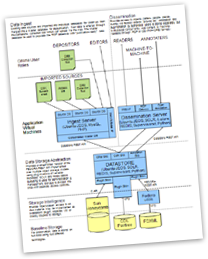 Neil Jefferies, who oversees the technical attributes of our union catalogue, will be presenting on the digital components of the Project next month at a conference entitled Digital Library: Digitising and Accessing Content (Slovakia, 22-24 September 2010). The event will bring together libraries from across Europe to share technologies, best practices, and emerging global standards in the field of large data sets and metadata preservation in the cultural and heritage sectors. Neil, who will also be delivering a keynote lecture at the conference, will be describing the catalogue’s innovative system architecture and its relationship to the Digital Asset Management System, which has been developed as a platform to support digital library projects within Oxford. Further details are available on the conference website.
Neil Jefferies, who oversees the technical attributes of our union catalogue, will be presenting on the digital components of the Project next month at a conference entitled Digital Library: Digitising and Accessing Content (Slovakia, 22-24 September 2010). The event will bring together libraries from across Europe to share technologies, best practices, and emerging global standards in the field of large data sets and metadata preservation in the cultural and heritage sectors. Neil, who will also be delivering a keynote lecture at the conference, will be describing the catalogue’s innovative system architecture and its relationship to the Digital Asset Management System, which has been developed as a platform to support digital library projects within Oxford. Further details are available on the conference website.
 We are currently seeking a Postdoctoral Fellow, fluent in both Czech and English, to work on the correspondence of the pioneering Moravian educational theorist Jan Amos Comenius (1592-1670). The successful candidate (who will be employed by and based at the Department for the Study and Editing of Comenius’s Work at the Institute of Philosophy of the Czech Academy of Sciences in Prague) will continue the compilation, translation, and correction of a database and digital archive of Comenius’s complete correspondence, which will form a central component of the Project’s union catalogue. The deadline for applications is noon on Wednesday 15 September 2010; further details and application instructions are available in English on our vacancies page and in Czech on the website of the Institute of Philosophy.
We are currently seeking a Postdoctoral Fellow, fluent in both Czech and English, to work on the correspondence of the pioneering Moravian educational theorist Jan Amos Comenius (1592-1670). The successful candidate (who will be employed by and based at the Department for the Study and Editing of Comenius’s Work at the Institute of Philosophy of the Czech Academy of Sciences in Prague) will continue the compilation, translation, and correction of a database and digital archive of Comenius’s complete correspondence, which will form a central component of the Project’s union catalogue. The deadline for applications is noon on Wednesday 15 September 2010; further details and application instructions are available in English on our vacancies page and in Czech on the website of the Institute of Philosophy.









 We are currently seeking a Postdoctoral Fellow, fluent in both Czech and English, to work on the correspondence of the pioneering Moravian educational theorist
We are currently seeking a Postdoctoral Fellow, fluent in both Czech and English, to work on the correspondence of the pioneering Moravian educational theorist 
 Join
Join 